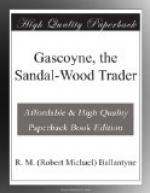Here the young man explained to the attentive Bumpus the course that he was to follow, and, having got him thoroughly to understand his part, he sent him away to execute it. Meanwhile he and his mother went in search of Mr. Mason, who at the time was holding a consultation with the chiefs of the native village, near the site of his burnt cottage. The consultation had just been concluded when they reached the spot, and the missionary was conversing with the native carpenter who superintended the erection of his new home.
After the morning greeting, and a few words of general conversation, Mrs. Stuart said: “We have come to talk with you in private; will you walk to Alice’s tree with us?”
“Certainly, my friend; I hope no new evils are about to befall us,” said the missionary, who was startled by the serious countenances of the mother and son; for he was ignorant of the close relation in which they stood to Gascoyne, as, indeed, was every one else in the settlement, excepting Montague and his boatswain and Corrie, all of whom were enjoined to maintain the strictest secrecy on the point.
“No; I thank God, all is well,” replied Mrs. Stuart; “but we have come to say that we are going away.”
“Going away!” echoed the missionary, in surprise. “When?—where to?—why? You amaze me, Mary.”
“Henry will explain.”
“The fact is, Mr. Mason?” said Henry, “circumstances require my absence from Sandy Cove on a longer trip than usual, and I mean to take my mother with me. Indeed, to be plain with you, I do not think it likely that we shall return for a long time, perhaps not at all; and it is absolutely necessary that we should go secretly. But we could not go without saying good-by to you.”
“We owe much to you, dear Mr. Mason,” cried the widow, grasping the missionary’s hand and kissing it. “We can never, never forget you; and will always pray for God’s best blessings to descend on you and yours.”
“This is overwhelming news!” exclaimed Mr. Mason, who had stood hitherto gazing from the one to the other in mute astonishment. “But, tell me, Mary” (here he spoke in earnest tones), “is not Gascoyne at the bottom of this?”
“Mr. Mason,” said Henry, “we never did, and never will deceive you. There is a good reason for neither asking nor answering questions on this subject just now. I am sure you know us too well to believe that we think of doing what is wrong, and you can trust us—at least my mother—that we will not do what is foolish.”
“I have perfect confidence in your hearts, my dear friends,” replied Mr. Mason; “but you will forgive me if I express some doubt as to your ability to judge between right and wrong when your feelings are deeply moved, as they evidently are, from some cause or other, just now. Can you not put confidence in me? I can keep a secret, and may, perhaps, give you good counsel.”
“No, no,” said Henry, emphatically; “it will not do to involve you in our affairs. It would not be right in us just now to confide even in you. I cannot explain why—you must accept the simple assurance in the meantime. Wherever we go, we can communicate by letter, and I promise, ere long, to reveal all.”




